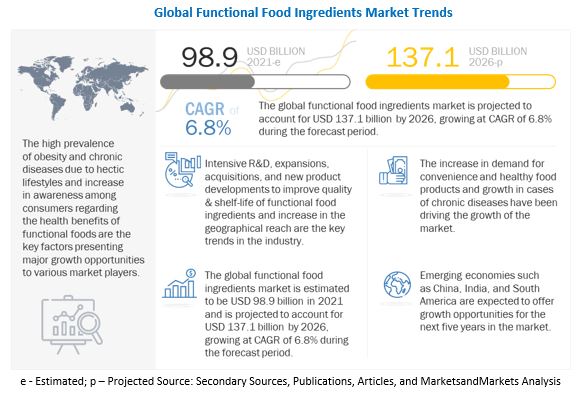
The functional food ingredients market is estimated to be valued at USD 98.9 billion in 2021. It is projected to reach USD 137.1 billion by 2026, recording a CAGR of 6.8% during the forecast period. The usage of functional food ingredients in the manufacturing of functional food & beverage products is expected to provide nutritive health benefits, prevent/resist chronic diseases, or act as energy boosters. The addition of functional food ingredients aids in the provision of nutritive benefits, over and above the basic nutritive capacities of traditional food products. The rising health awareness among the global population has had a major influence on the demand for functional food ingredients. The global market is witnessing the development of a wide range of applications of functional food ingredients, such as fortifying food & beverage products. The key players in this market indulge in substantial investments in new technology and product development to provide high-quality and cost-effective solutions to customers.
Download PDF brochure: https://www.marketsandmarkets.com/pdfdownloadNew.asp?id=9242020
Some of the prominent key players are:
• Cargill, Incorporated (US)
• BASF SE (Germany)
• Archer Daniels Midland Company (US)
• Arla Foods (Denmark)
• Kerry Group (Ireland)
• Ajinomoto Co., Inc. (Japan)
Probiotics segment accounts for a major share in the functional food ingredients market.
Probiotics dominated the market in 2020. Probiotics provide numerous health benefits beyond providing basic nutritional value. In recent times, there has been increased interest in the use of probiotics in food applications. The selection of new probiotic strains and the development of new applications have gained much importance. The use of probiotics has been known to provide many health benefits to humans. They are intended to assist the body’s naturally occurring gut microbiota. Some of them are used to prevent diarrhea caused by antibiotics or as part of the treatment of antibiotic-related dysbiosis. Antigenotoxicity, antimutagenicity, and anticarcinogenicity are important potential functional properties of probiotics. According to the Department of Medical Nutrition, Karolinska Institute (Sweden), the consumption of fermented dairy products is associated with a lower prevalence of colon cancer, which suggests that probiotics can decrease the risk of cancer by inhibition of carcinogens and procarcinogens, inhibition of bacteria capable of converting procarcinogens to carcinogens.
Cost-effective food products with high nutritional benefits tend to drive the market.
With the increasing awareness among consumers, the market for functional food is increasing as consumers prefer balanced diets and food that not only addresses their appetite, but also helps enhance their immunological tolerance. This, along with product innovations in terms of flavors and variant offerings, presents significant opportunities for the growth of applications in the functional food ingredients market. Factors that further fuel consumer interest in functional foods are the rapid advances in science & technology, increase in health care costs, aging, and growth in interest in attaining wellness through diet, among others. The snacks subsegment is projected to grow at the highest CAGR during the forecast period as customers around the globe are increasingly inclined toward food items that can easily be consumed without any effort. The increase in demand for snacks & convenience food products in the Asia Pacific region has witnessed a rise in demand for various functional food ingredients that have led consumers to adopt healthier lifestyles. This has led to an increase in consumption due to the constant increase in population, rise in disposable income, and changes in lifestyle trends.
Make an Inquiry: https://www.marketsandmarkets.com/Enquiry_Before_BuyingNew.asp?id=9242020
Geographic Prominence
North American consumers are becoming increasingly health-conscious and have started to pay close attention to the labels of food products. This has led to a heightened awareness toward the food ingredients that they consume; these factors have been fueling the market growth for functional food ingredients. The North American region holds potential for the consumption of functional food ingredients and is expected to play an important role in the global market. This dominance is driven by the prevalence of chronic diseases due to hectic lifestyles and increasing awareness among consumers regarding the health benefits of functional foods. In addition, the region has the highest prevalence of obesity. According to CRN 2019 data, over three-quarters of all US adults take dietary supplements; 58% take multivitamins; 31%, vitamin D; 28%, vitamin C; 21%, protein; 20%, calcium; 20%, B complex; 16%, omega-3s; 15%, green tea; 14%, magnesium; 13%, probiotics; 13%, iron; 12%, turmeric; and 12%, vitamin E. The functional food ingredients industry focuses on investing more in research programs with an aim to introduce new ingredients to address the diversified demands from potential customers in the region.
